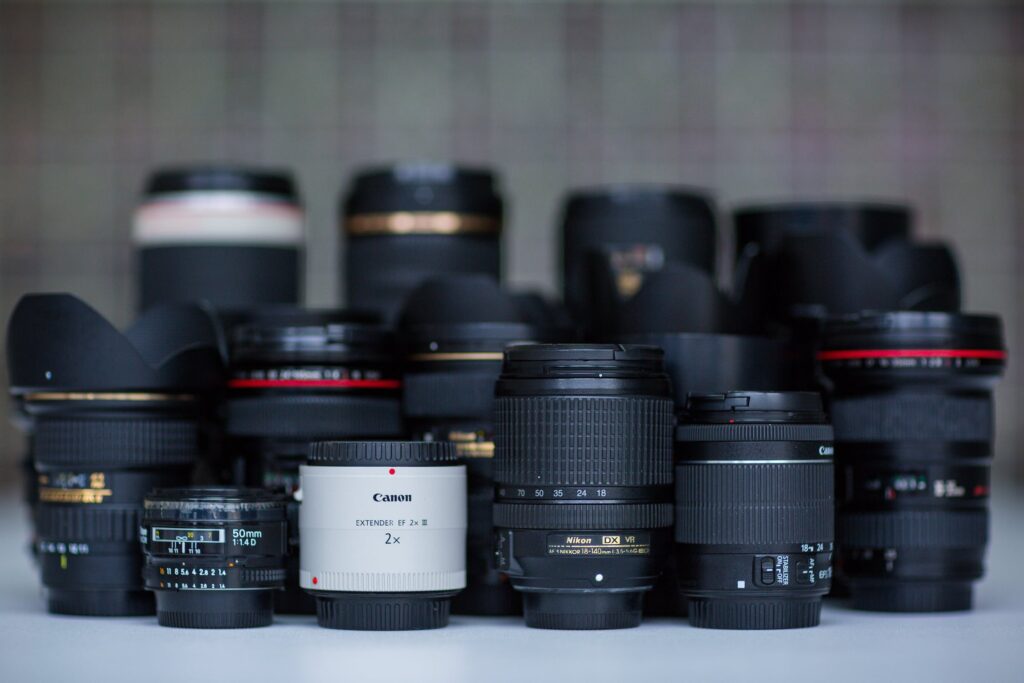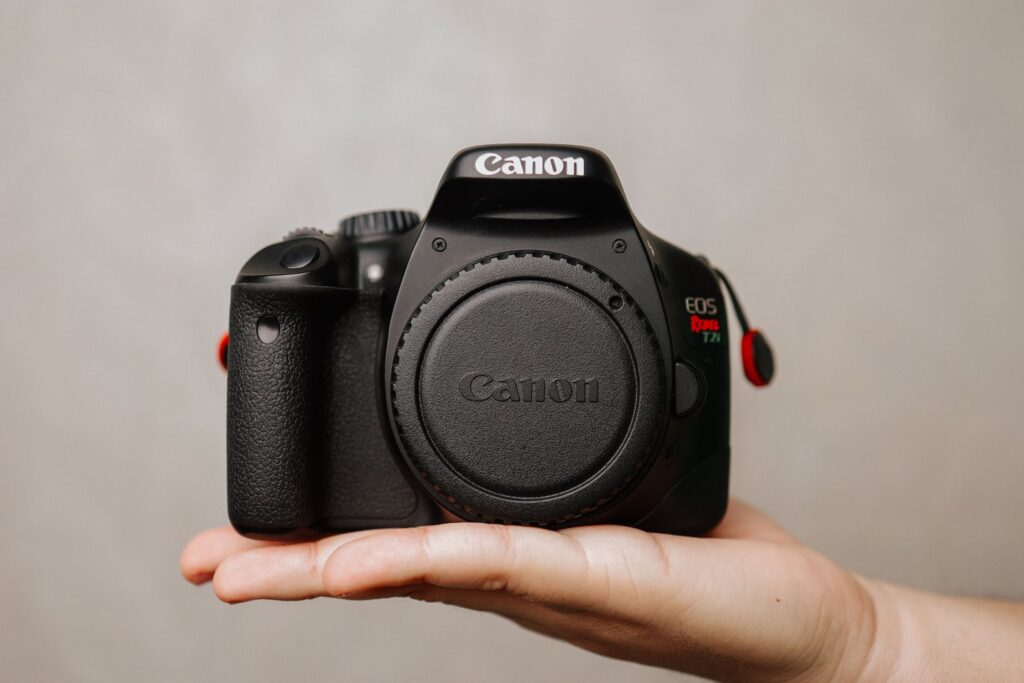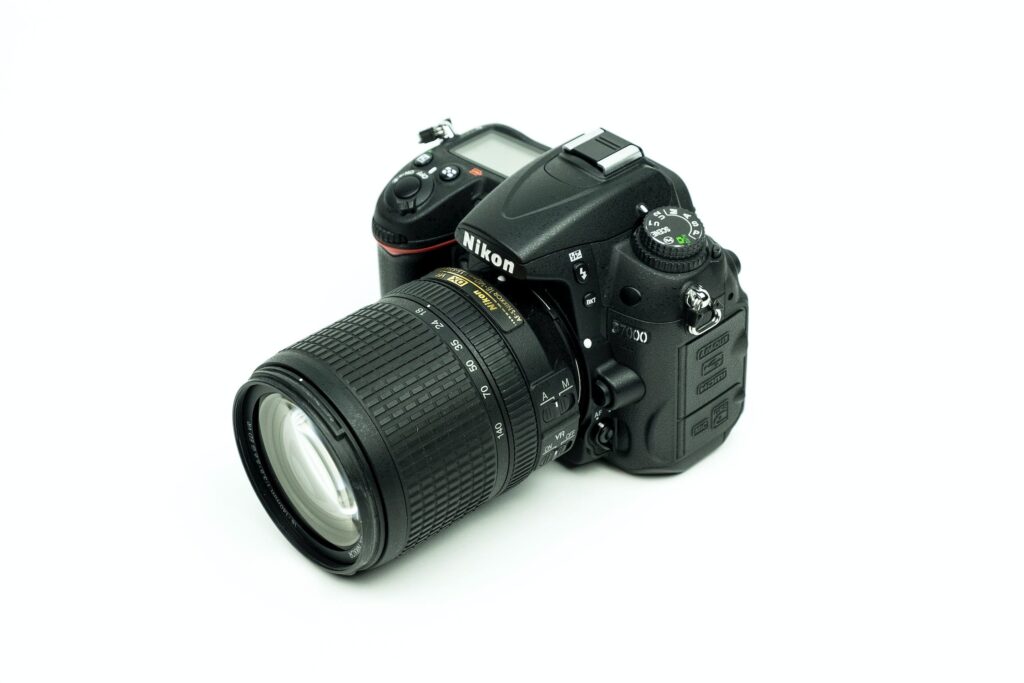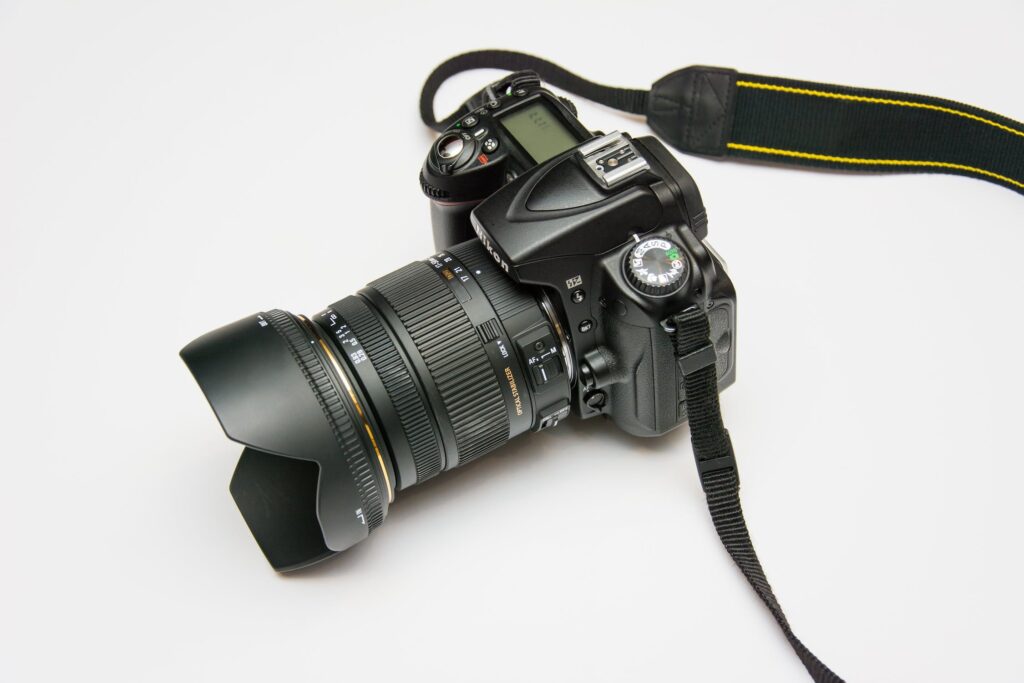As a camera and photography enthusiast, you may have encountered a situation where you wish to use a Nikon lens on a Canon camera or vice versa. However, you must have wondered if such an endeavor is possible or just a pipe dream.
Today, we will delve into this issue to clear up all the myths and misunderstandings surrounding Nikon lenses and Canon cameras, including, “Can I use a Nikon lens on a Canon camera?” The answer cannot be a straight yes and no!

Despite the common belief, using a Nikon lens on a Canon camera with the help of an adapter is possible. This compatibility is due to the flange distance, which is the space between the mounting ring and the camera sensor.
Nikon’s F-mount cameras have a larger flange distance than Canon’s EF-mount cameras. Therefore, a Nikon lens can physically fit onto a Canon body when equipped with an appropriate adapter.
However, you may encounter certain limitations, such as manual focusing. It’s important to note that using an adapter might not yield the same quality results as using a Canon lens on a Canon camera or a Nikon lens on a Nikon camera due to differences in lens and sensor technologies. Always research and consider these factors before making a decision.
Related: Where are Nikon Cameras Made? You’ll Be Surprised
Can I Use a Nikon Lens on a Canon Camera?

The type of Nikon lenses you can use on a Canon camera largely depends on the adapter you use. The most commonly used Nikon lenses on Canon cameras are the Nikon F-mount lenses because of their more significant flange distance.
These include both Nikon’s DX and FX lenses. Nikon G lenses can also be used with the correct adapter, but remember, you’ll have to manually adjust the aperture as there is no mechanical connection to control it from the camera.
However, it’s crucial to mention that newer Nikon Z lenses (those with a Z-mount) will not work with Canon cameras, even with an adapter, due to their smaller flange distance.
Similarly, older Nikon lenses that use a screw-drive autofocus system will not autofocus on Canon cameras because Canon bodies do not have the necessary mechanical drive to operate the autofocus.
The key is to thoroughly research which Nikon lenses work best with your Canon body, considering the limitations of using an adapter.
Which Canon Cameras Can I Use with Nikon Lenses?

Almost all Canon DSLR cameras, particularly those with an EF mount, can technically use Nikon F-mount lenses with the help of an adapter. This includes popular models such as the Canon EOS 5D, 6D, 7D, 80D, and the Rebel series.
Also, the recent Canon EOS R series mirrorless cameras, with the new RF mount, can use Nikon lenses but require a different adapter than DSLR cameras.
The performance and compatibility of the Nikon lens with a Canon camera will largely depend on the specific models in question and the quality of the adapter used.
While it is technically possible to use Nikon lenses on Canon cameras, the decision should be made carefully, considering potential limitations and the impact on image quality. Using lenses designed for your camera’s native mount will always offer optimal performance and image quality.
What Adapters Can You Use for Your Nikon or Canon Camera?
Let’s delve into the realm of lens adapters a bit more. First, a Canon to Nikon lens adapter. Such an adapter, like the Fotodiox Pro Lens Mount Adapter, allows Canon lenses to be used on Nikon bodies. However, remember that focus, aperture, and other lens-driven features usually must be manually controlled.
Similarly, a Nikon to Canon lens adapter, such as the K&F Concept Lens Mount Adapter, permits Nikon lenses to be mounted on Canon bodies. Like its Canon to Nikon counterpart, this adapter necessitates manual focus and aperture control.
What Are the Disadvantages of Using an Adapter on Your Nikon or Canon Camera?
Using an adapter on your camera lens can yield a variety of outcomes, both positive and negative.
On the one hand, adapters can open the door to a new world of possibilities, allowing you to use lenses from different brands or vintage ones on your modern camera body. In doing so, they can significantly broaden your lens options and let you experiment with unique and creative photographic effects.
However, on the flip side, using an adapter can have considerable drawbacks. It’s important to remember that adapters are a workaround – enabling something the camera and lens were not originally designed to do.
Even though these adapters enable physical compatibility, they cannot fully integrate the systems of the two different brands. Hence, certain automated features, such as autofocus and electronic aperture control, are typically lost.
Furthermore, while adapters can make these cross-brand combinations possible, the results can be inconsistent, compromising image quality. Awareness of these limitations is essential before opting for lens adapters.
Using an adapter can also harm your camera or lens over time. The adapter may loosen up or not provide an appropriate fit, causing the lens to wobble and shake inside the camera body or even damaging the lens mount or camera mount. As a result, I’d highly recommend you stick to your camera brand’s lenses to ensure the best results.
How to Check if a Lens is Compatible with Your Nikon or Canon Camera?

To ascertain if a lens is compatible with your camera, you need to consider the following steps:
- Check the lens mount: The lens mount is a standard feature on your lens and camera body. This mount must be the same type for both the lens and the camera for compatibility.
This information can usually be found in the product specifications or manual. For example, if you have a Canon camera with an EF mount, you must ensure your lens also has an EF mount. - Consider the sensor size: DSLR and mirrorless cameras come with either a full-frame or a crop sensor. Full-frame lenses can be used on crop sensors, but the image will not fill the entire frame if you try to use a lens designed for a crop sensor on a full-frame camera.
- Research the brand: Some brands design lenses that can be used across their range of cameras, while others might have lenses specific to certain models. Always check the brand’s website or consult their customer service to confirm.
- Use a lens compatibility checker: Some online platforms, such as the lens compatibility checker on different websites (e.g. Canon Lenses Compatibility), allow you to input the camera model to see a list of compatible lenses.
- Look out for third-party lenses: Companies like Sigma, Tamron, and Tokina design lenses that fit a variety of camera brands. However, specify your camera brand when purchasing to get the correct mount.
Conclusion
The feasibility of using Nikon lenses on Canon cameras – or vice versa – largely depends on the specific models of the camera and lens and the adapter in use.
Although lens adapters offer versatility and the unique opportunity to cross-utilize lenses from different brands, they also introduce potential risks and limitations.
Significant considerations include the loss of automated features, such as autofocus and electronic aperture control, inconsistency in image quality, and the potential for physical damage to the camera or lens.
Therefore, while experimenting with lens adapters can be enticing, it is generally recommended to use lenses designed for your camera’s native mount for optimal performance and image quality. Conduct thorough research and consider your specific photography needs before deciding.
Frequently Asked Questions
Can I use any lens on a Canon camera?
No, not every lens can be used on a Canon camera. The primary determinant is the type of lens mount on both the camera and the lens. Canon EF and EF-S mounts are common for Canon DSLRs, while Canon RF and EF-M mounts are designed for Canon’s mirrorless range.
You can use Canon lenses on Canon cameras, as they are designed to be compatible. However, using lenses from other manufacturers, such as Nikon or Sony, would generally require an adapter, potentially compromising functionality and image quality.
Third-party lens manufacturers, like Sigma, Tamron, and Tokina, also produce lenses compatible with Canon cameras, provided you select the correct mount type when purchasing. Refer to your camera and lens manuals or the manufacturer’s website for compatibility.
Can I use a Nikon DSLR lens on a Canon mirrorless camera?
Yes, it is technically possible to use a Nikon DSLR lens on a Canon mirrorless camera with the help of an adapter. However, you must remember that adapters come with their own set of challenges and limitations.
While they allow for physical compatibility between the camera and the lens, certain automated features like autofocus and electronic aperture control can be lost.
Additionally, using an adapter for these cross-brand combinations can sometimes lead to inconsistencies in image quality. There could also be potential physical damage over time if the adapter does not fit properly, causing the lens to wobble inside the camera body.
Always use a high-quality adapter designed for your Nikon lens and Canon camera models to minimize these risks.
Despite these challenges, adapters can utilize a broader range of lens options. However, for optimal results, using lenses designed for your camera’s native mount is generally recommended.
Will Nikon lenses fit other cameras?
Nikon lenses, particularly those with an F-Mount, are primarily designed to fit Nikon DSLR cameras.
However, with suitable adapters, it is possible to mount these lenses on cameras of other brands. For instance, Nikon lenses can be adapted to fit Canon EOS, Sony Alpha, or Micro Four Thirds cameras.
It’s crucial to remember that functionality might be compromised, as adapters can potentially disrupt autofocus, electronic aperture control, and other automated features.
Moreover, Nikon’s Z-mount lenses for mirrorless cameras are not interchangeable with F-mount lenses without an adapter, even within Nikon’s range of cameras.
As with other brand combinations, using adapters can lead to potential fit, stability, and image quality issues. Always ensure to use an adapter specifically designed for both your Nikon lens and the camera on which you plan to use it.
For optimal performance and image quality, it is generally recommended to use lenses designed for your camera’s native mount. Remember, each case of cross-brand use should be researched individually to understand all potential risks and limitations.